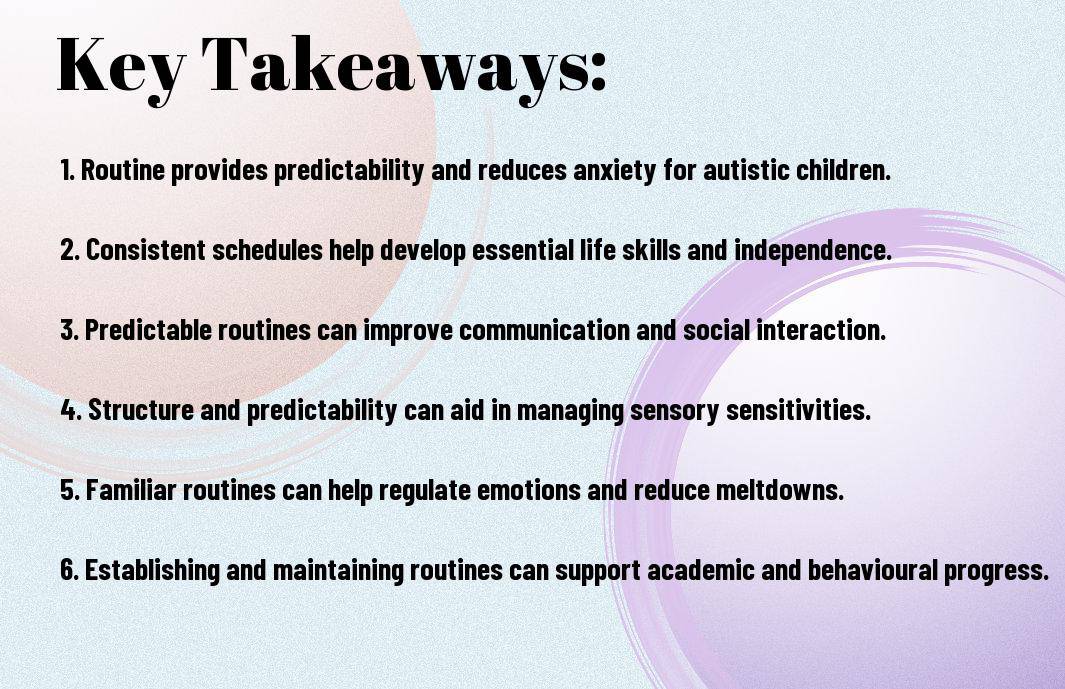Amidst the unique challenges faced by children with autism, a consistent and structured routine plays a crucial role in their overall well-being and development. Consistency is fundamental for children with autism, as it provides a sense of predictability and stability in their daily lives, helping to reduce anxiety and prevent meltdowns. Structured routines assist in improving communication, promoting independence, and enhancing social skills, ultimately leading to a more fulfilling and balanced life for children with autism. However, disruptions to their routine can have serious consequences, impacting their emotional and behavioural regulation. Therefore, it is imperative for parents, educators, and caregivers to understand and prioritise the significance of maintaining a stable and predictable routine for children with autism, as it greatly influences their overall quality of life.
Key Takeaways:
- Consistency is Crucial: Establishing and maintaining a routine is essential for children with autism as it provides a sense of predictability and stability in their daily lives.
- Reduces Anxiety and Meltdowns: A structured routine can help minimise anxiety and prevent behavioural meltdowns by giving the child a clear understanding of what to expect next.
- Improves Communication and Learning: Following a regular routine can aid in developing communication skills, improving social interactions, and enhancing learning abilities in children with autism.

The Role of Routine in Promoting Stability
For children with autism, routine plays a crucial role in promoting stability and providing a sense of predictability and security. Establishing and maintaining a routine can significantly impact a child’s daily life, helping to reduce anxiety and stress while fostering a sense of stability and confidence. To learn more about the importance of rules and routines for children with autism, you can visit Rules and Routines | Nebraska Autism Spectrum Disorders Network.
Predictability and Security
Routine provides children with autism a predictable pattern of events, which can offer a sense of security and control. Knowing what to expect in their daily routine can help reduce feelings of uncertainty and provide a reassuring structure to their day. This predictability can lead to a greater sense of security, minimising the likelihood of disruptive behaviours and promoting a calmer, more focused mindset.
Having a consistent routine can also aid in improving a child’s ability to manage unexpected changes, as they are better equipped to navigate through unfamiliar situations when they have a strong foundation of predictability and security.
Reduction of Anxiety and Stress
Routine plays a vital role in the reduction of anxiety and stress for children with autism. It provides a sense of familiarity and control, which can help alleviate anxiety-inducing situations. By knowing what to expect, children with autism feel more secure and are better equipped to manage their emotions and reactions. This reduction in anxiety and stress can lead to improved overall well-being and a more positive outlook on daily life.
Incorporating consistent routines into a child’s daily life can help establish a sense of rhythm and stability, ultimately fostering a more manageable and harmonious environment for both the child and their caregivers.

Establishing Effective Routines
When it comes to children with autism, establishing effective routines is essential for their well-being and development. Routines provide a sense of predictability and structure, which can help reduce anxiety and improve overall behaviour. One valuable resource for maintaining a routine for your child with autism during summer break can be found here.
Consistency in Daily Activities
Consistency in daily activities is crucial for children with autism as it helps them navigate their day with more confidence and less stress. It is important to establish consistent timings for waking up, meals, and bedtime, as well as incorporating specific activities such as sensory play and quiet time. Consistency in daily activities can provide a sense of security and stability for children with autism, helping them feel more at ease in their environment.
Involving Children in Routine Development
Involving children in the development of their routines can be highly beneficial. It allows them to feel a sense of control and ownership over their day, which can lead to a greater sense of empowerment and self-esteem. Additionally, it provides opportunities for children to practice decision-making skills and learn time management, which are valuable life skills for their future. By involving children in routine development, it fosters a sense of independence and responsibility.
By involving children in routine development, it not only helps in establishing effective routines but also promotes positive behavioural changes and a greater sense of engagement in daily activities.
Challenges and Adaptations
Children with autism often face unique challenges when it comes to adapting to routines. The rigidity of their thinking and difficulty with transitions can make it challenging for them to adjust to new or unexpected changes in their daily routines. This can lead to meltdowns, anxiety, and an overall sense of disorientation.
Flexibility Within Structure
One way to address this challenge is to introduce flexibility within the structure of their routines. By allowing for some degree of flexibility, such as providing choices within a certain activity or allowing for some deviation from the schedule, children with autism can learn to adapt in a more manageable way. This can help reduce their anxiety and improve their ability to cope with unexpected changes.
Tailoring Routines to Individual Needs
Another important adaptation for children with autism is tailoring their routines to their individual needs. This means considering their specific preferences, sensitivities, and challenges when creating and implementing their daily schedules. By tailoring their routines to their individual needs, we can ensure that their needs are met in a way that promotes their well-being and overall development.
In some cases, this may mean making adjustments to their routines based on their sensory sensitivities, communication abilities, or specific interests. By taking these individual factors into account, we can create routines that are more effective and supportive for children with autism.

The Impact of Routine on Family Dynamics
Introducing and maintaining a routine for a child with autism can have a significant impact on the dynamics within a family. It can bring a sense of stability and predictability, which is essential for reducing stress and anxiety levels for both the child and their family members. Consistency in routine can help create a harmonious environment and promote a sense of security and calmness within the household.
Sibling Involvement and Support
Siblings play a crucial role in the lives of children with autism, and involving them in the established routines can foster a sense of unity and understanding within the family. It’s important to provide siblings with opportunities to participate in activities with their autistic sibling, and to educate them about the significance of the routine. Additionally, encouraging open communication and offering emotional support to the siblings can help them navigate their unique family dynamics.
Coping Strategies for Parents and Caregivers
Parents and caregivers of children with autism often face immense challenges, and maintaining the established routines can be demanding. Implementing self-care strategies, seeking support from other parents, and accessing professional assistance can significantly help in coping with the stress and demands of managing the routines. It’s crucial for parents and caregivers to understand that it’s acceptable to ask for help and to prioritise their own well-being in order to better support their child’s needs.
It is essential for parents and caregivers to recognise their own strengths and limitations in managing the routines for their child with autism. Seeking guidance and assistance from relevant professionals and support groups can have a positive impact on their well-being and their ability to provide effective care for their child.
The Importance of Routine for Children with Autism
In conclusion, routine is crucial for children with autism as it provides them with a sense of security and predictability in their daily lives. By following a structured routine, children with autism can better manage their sensory sensitivities, reduce anxiety, and improve their social and communication skills. Furthermore, a consistent routine can help children with autism develop important life skills and independence. It is important for parents, educators, and caregivers to understand the significance of routine for children with autism and to establish and maintain a predictable daily schedule that meets their specific needs. By prioritising routine, we can create a supportive and inclusive environment that enables children with autism to thrive and reach their full potential.
FAQ
Q: Why is routine important for children with autism?
A: Routine provides structure and predictability, which can help reduce anxiety and improve overall behaviour and well-being for children with autism.
Q: How does routine benefit children with autism?
A: Routine can help children with autism feel more secure, improve their ability to cope with unexpected changes, and enhance their social and communication skills.
Q: What are the challenges of establishing a routine for children with autism?
A: Children with autism may struggle with flexibility and transitioning between activities, making it challenging to establish and maintain a routine.
Q: How can parents and caregivers help implement a routine for children with autism?
A: Parents and caregivers can use visual schedules, create a consistent daily routine, and provide clear expectations and transitions to support the implementation of routine for children with autism.
Q: Are there specific activities or strategies that can be included in a routine for children with autism?
A: Activities such as sensory play, social stories, and structured leisure time can be beneficial for children with autism as part of their daily routine.
Q: What are the potential consequences of not having a routine for children with autism?
A: Without a routine, children with autism may experience increased anxiety, behavioural challenges, and difficulties in adapting to new situations or environments.
Q: How can schools and educational institutions support the routine needs of children with autism?
A: Schools can provide individualised schedules, sensory-friendly environments, and specialised support to help children with autism maintain a consistent routine in an educational setting.







